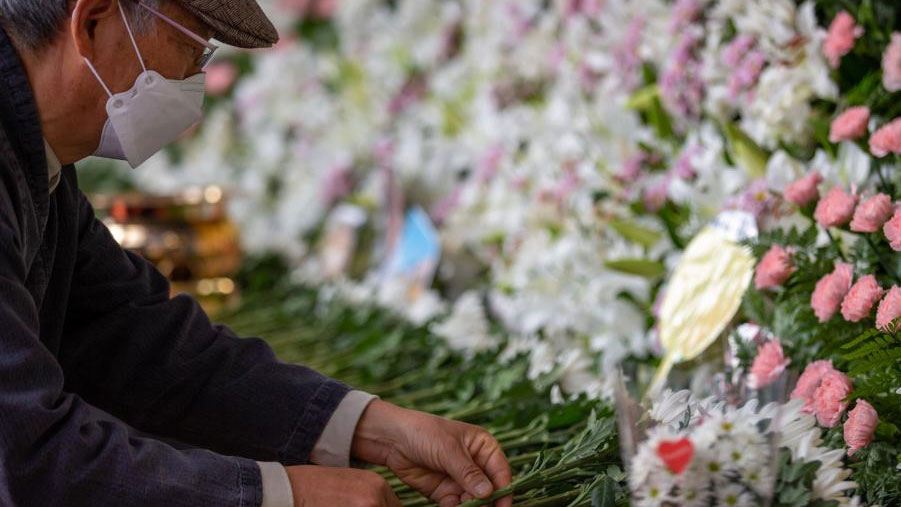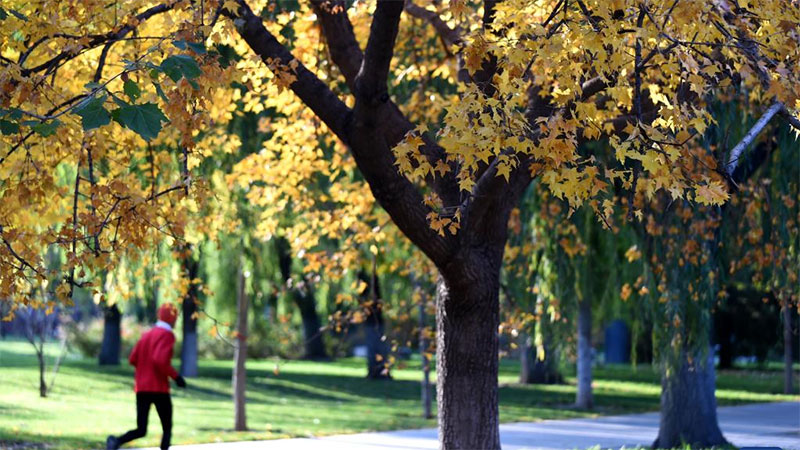Special education adds color to life for children in Tibet
LHASA, Nov. 4 (Xinhua) -- In a bright music classroom, Tsering Lhamo, 47, patiently taught a little girl to play piano. Following the big hands, the visually impaired girl touched the black and white keys gently and created a melody with a smile.
The room was soon filled with flowing piano sounds.
Tsering Lhamo is the headmaster of the Nagqu Special Education School in the city of Nagqu, southwest China's Tibet Autonomous Region. She still remembers the difficulties encountered in recruiting students when the school was established in 2013 -- the first school of its kind in the city.
Sparsely distributed in this pastoral area, residents knew little about special education at that time. To look for students, Tsering Lhamo and other teachers spent two months visiting villages and townships across Nagqu.
"In 2013, some townships and villages did not have asphalt roads, and we had to trek on bumpy roads across mountains to reach students' homes. But the more difficult thing was to win the trust of skeptical parents, who were reluctant to send their children to school," Tsering Lhamo recalled.
"Parents had many doubts about how their children would communicate and what they could learn in school. We showed them photos and videos about the school to win their trust," she said. "Our efforts finally paid off and we recruited over 60 children with visual, hearing or language impairment."
Jochung, whose grandchildren Tsering Yangzom and Losang Tsultrim both have mental disabilities, was worried when he sent them to the school. But when the siblings returned home with small pottery figurines they had made themselves, he knew his choice was right.
"Now they have fully gotten used to school life and have become more confident," said Jochung.
Tsering Lhamo has devoted herself to special education for years. In order to communicate with students with language impairment, she learned sign language. To know more about the challenges faced by visually impaired students, she sometimes chose to be blindfolded when living with them.
The school compiles a combination of basic cultural knowledge, vocational skills and sports rehabilitation courses, which are then tailored to best serve the character traits and development needs of each child.
The school has also gradually established a "1+3" curriculum system, in which "1" refers to the courses prescribed by the country, and "3" refers to three groups of courses for students with mental, visual or hearing impairment.
"Personalized curriculums require teachers to make greater efforts, which are not only supported by our expertise, but also by our love for children. We try to eliminate the obstacles for these children so as to help them integrate into society as much as possible," Tsering Lhamo said.
Sonam Wangdu, who entered the school in 2013, opened a small tailor shop in 2016, earning over 100,000 yuan (about 13,798 U.S. dollars) in two years.
"It was the special education school that taught me skills to earn money for myself and my family," said Sonam Wangdu.
So far, 65 former students of the school have realized their dreams of employment, entrepreneurship, and regular and further education.
Tsering Lhamo said the number of students in the school has risen to 101 with seven types of disabilities at the moment, with ages ranging from 5 to 18. "More and more parents have realized the importance of special education and sent their children to school," she said.
In May this year, a second special education school was established in Nagqu. It focuses on hearing, speaking and visually impaired students, while the first one has become a school for students with mental disabilities.
Drugta, 22, one of the first students of the special education school, passed the college entrance examination for blind people in 2016 and was admitted to Nanjing Normal University of Special Education. He has graduated now and plans to work in the second special education school in Nagqu.
"It was special education that changed my destiny and I'd like to make my contribution to special education," said Drugta.
According to the report to the 20th National Congress of the Communist Party of China held last month, China will "strengthen public-benefit special needs education" and "promote the all-round development of related programs for people with disabilities."
"In the past years, I have witnessed the support of the country for the cause of special education. Nowadays more and more children with disabilities are receiving special education in Tibet and enjoying a colorful life of self-independence and happiness," said Tsering Lhamo.
Photos
Related Stories
Copyright © 2022 People's Daily Online. All Rights Reserved.









